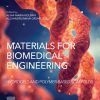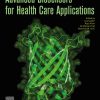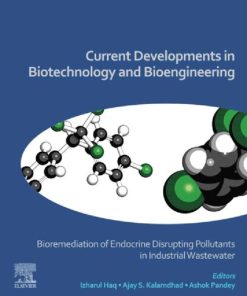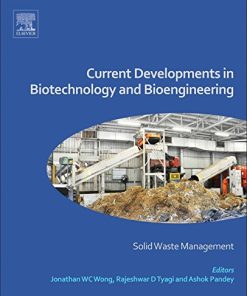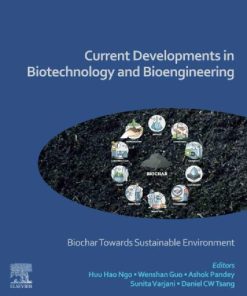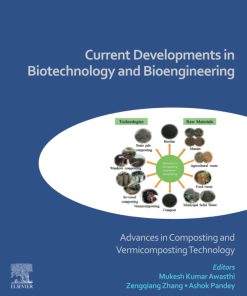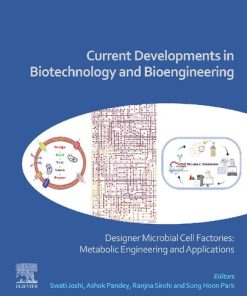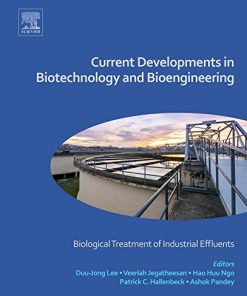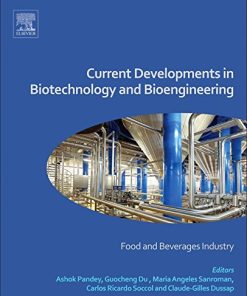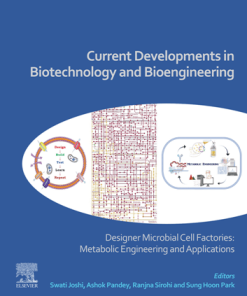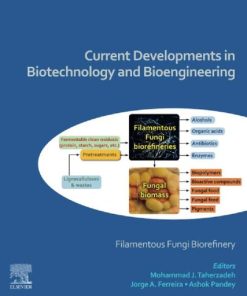(EBOOK PDF)Current Developments in Biotechnology and Bioengineering Sustainable Food Waste Management Resource Recovery and Treatment 1st Edition by Jonathan Wong, Guneet Kaur 9780128191491 012819149X full chapters
$50.00 Original price was: $50.00.$25.00Current price is: $25.00.
Current Developments in Biotechnology and Bioengineering Sustainable Food Waste Management Resource Recovery and Treatment 1st Edition by Jonathan Wong, Guneet Kaur – Ebook PDF Instant Download/Delivery: 9780128191491, 012819149X
Full download Current Developments in Biotechnology and Bioengineering Sustainable Food Waste Management Resource Recovery and Treatment 1st Edition after payment
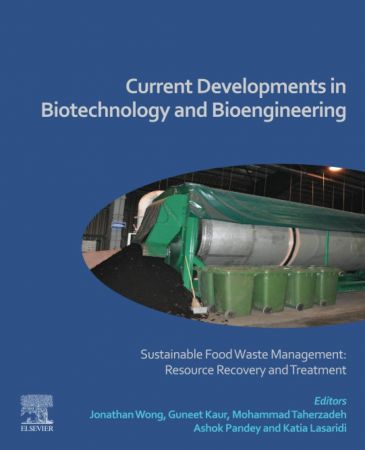
Product details:
• ISBN 10:012819149X
• ISBN 13:9780128191491
• Author:Jonathan Wong, Guneet Kaur
Current Developments in Biotechnology and Bioengineering
Sustainable Food Waste Management: Resource Recovery and Treatment
Current Developments in Biotechnology and Bioengineering: Sustainable Food Waste Management: Resource Recovery and Treatment covers the latest methods of food waste management and resource recovery from a sustainability perspective and is suitable for universities, municipalities, and companies working in the field. This book provides a comprehensive account of food waste chemistry, the latest techniques for food waste treatment and recycling, sustainability assessment (social, economic, environmental), and challenges in food waste management. The book explores recycling to value-added products using sustainable concepts and methodologies, and is useful as a course or reference book for biochemical engineering, environmental sustainability, and waste management.
Covers recycling to value-added products using sustainable concepts and methodologies
Provides an exhaustive description of general treatment options and their evaluation guidelines in terms of cost, energy consumption, and waste generation, enabling readers to understand the principles behind various recovery and treatment schemes
Describes existing and emerging food waste recycling technologies, products obtained, and process efficiencies
Offers a thorough account of critical factors and challenges in food waste valorization, such as handling of new emerging contaminants, end-product purity, and life-cycle assessment
Current Developments in Biotechnology and Bioengineering Sustainable Food Waste Management Resource Recovery and Treatment 1st Table of contents:
Chapter One: Sustainable Food Waste Management: An Introduction
Abstract 1: Introduction
2: Food Waste Generation and Collection
3: Food Waste Prevention
4: Food Waste Management and Treatment Technologies
5: Conclusions and Perspectives
Chapter Two: Food Waste Properties
Abstract
1: Introduction
2: Food Losses and Food Waste
3: Properties of Food Waste
4: Proximate Analysis
5: Chemical Properties
6: Nutrient Properties
7: Elemental Composition and Light Metal Ions
8: Carbohydrate, Protein, and Lipid Contents
9: Conclusions and Perspectives
Chapter Three: Food Waste Generation and Collection
Abstract
1: Introduction
2: Food Waste Generation
3: Food Waste Collection
4: Conclusions and Perspectives
Chapter Four: Closing the Food Chain Loop Through Waste Prevention
Abstract
1: Introduction
2: Toward a Sustainable and Circular Food Supply Chain
3: Prevention of Food Surplus and Avoidable Food Waste
4: Redistribution of Food Surplus for Human Consumption
5: Recycling Food Waste to Animal and Fish Feed
6: Conclusions and Perspectives
Chapter Five: Food Waste Composting: Challenges and Possible Approaches
Abstract
1: Introduction
2: Food Waste Properties
3: Controlling the Acidity During Composting
4: Nitrogen Loss and Its Control Measures
5: Conclusions and Perspectives
Chapter Six: Bioconversion Technologies: Anaerobic Digestion of Food Waste
Abstract
1: Introduction
2: Principles of Anaerobic Digestion
3: Characterizing Biochemical Parameters and Synergistic Effects
4: Inhibition Factors During Anaerobic Digestion of Food Waste
5: Anaerobic Digestion Technologies for Food Waste
6: Resource Recovery
7: Integrated Treatment of Food Waste Toward Zero Waste Discharge
8: Conclusions and Perspectives
Chapter Seven: Microbial Conversion of Food Waste: Volatile Fatty Acids Platform
Abstract
1: Introduction
2: VFAs Production During Anaerobic Digestion
3: Application of VFAs
4: Recovery and Purification of VFAs
5: Analytical Determination of VFAs
6: Conclusions and Perspectives
Chapter Eight: Bioconversion Technologies: Insect and Worm Farming
Abstract
1: Introduction
2: Fly Larvae for Food Waste Reduction
3: Earthworms
4: Cockroach
5: Crickets for Food Waste Reduction
6: Conclusions and Perspectives
Chapter Nine: Bioconversion Technologies: Hydrolytic Enzyme Treatment of Food Waste
Abstract
Acknowledgment
1: Introduction
2: Conventional Food Waste Management Models
3: Parameters Effecting Enzyme Activity During Food Waste Treatment
4: Food Waste Treatment Through Solid/Submerged State Fermentation Strategy
5: Conclusions and Perspectives
Chapter Ten: Bioproducts From Food Waste
Abstract
Acknowledgment
1: Introduction
2: Food Waste Generation
3: Food Waste Valorization Processes and Conversion to High-Value Products
4: Conclusions and Perspectives
Chapter Eleven: Conversion of Food Waste to Animal Feeds
Abstract
1: Introduction
2: Types of food waste
3: Nutritional value of food waste
4: Food Waste to Animal Feed—Processing Methods
5: Direct Conversion
6: Indirect Conversion
7: Food Waste to Animal Feed—Types
8: Conclusions and Perspectives
Chapter Twelve: Pyrolysis and Gasification of Food Waste
Abstract
Acknowledgments
1: Introduction
2: Principles of Pyrolysis and Gasification
3: Pyrolysis and Gasification Reactors
4: Factors Affecting the Pyrolysis and Gasification of Food Waste
5: Products of the Food Waste Pyrolysis and Gasification Processes: Gas, Liquid, and Solid Components
6: Conclusions and Perspectives
Chapter Thirteen: Emerging Technologies for the Treatment of Food Waste
Abstract
1: Introduction
2: Different Types of High-Value Products Recoverable From Food Waste
3: Biodrying (Bioevaporation)
4: Comanagement of Domestic Wastewater and Food Waste
5: Conclusions and Perspectives
Chapter Fourteen: Food Waste Policy
Abstract
1: Introduction
2: European Perspectives
3: North America—US Federal Government, State and Canadian Food Waste Policy Initiatives
4: Australia
5: Conclusions and Perspectives
Chapter Fifteen: Life-Cycle Assessment and Sustainability Aspects of Food Waste
Abstract
Acknowledgments
1: Introduction
2: Sustainable Development Goals and the Waste Hierarchy
3: Managing Food Surplus and Food Waste
4: The LCA Methodology
5: Environmental Perspectives of Different Waste Treatment Methods
6: Conclusions and Perspectives
Index
People also search for Current Developments in Biotechnology and Bioengineering Sustainable Food Waste Management Resource Recovery and Treatment 1st:
current developments in biotechnology
current developments in biotechnology and bioengineering
current developments in biotechnology and bioengineering abbreviation
current developments in biotechnology and bioengineering pdf
current developments in biotechnology and bioengineering impact factor
Tags:
Current Developments,Bioengineering,Sustainable,Waste Management,Jonathan Wong, Guneet Kaur
You may also like…
Engineering - Bioengineering
Current Developments in Biotechnology and Bioengineering: Solid Waste Management 1st Edition
Biology and other natural sciences - Biotechnology
Biology and other natural sciences - Biotechnology
Biology and other natural sciences - Biotechnology
Engineering - Bioengineering
Technique - Food Manufacturing
Current Developments in Biotechnology and Bioengineering: Food and Beverages Industry 1st Edition
Biology and other natural sciences - Biotechnology
Biology and other natural sciences - Biotechnology


